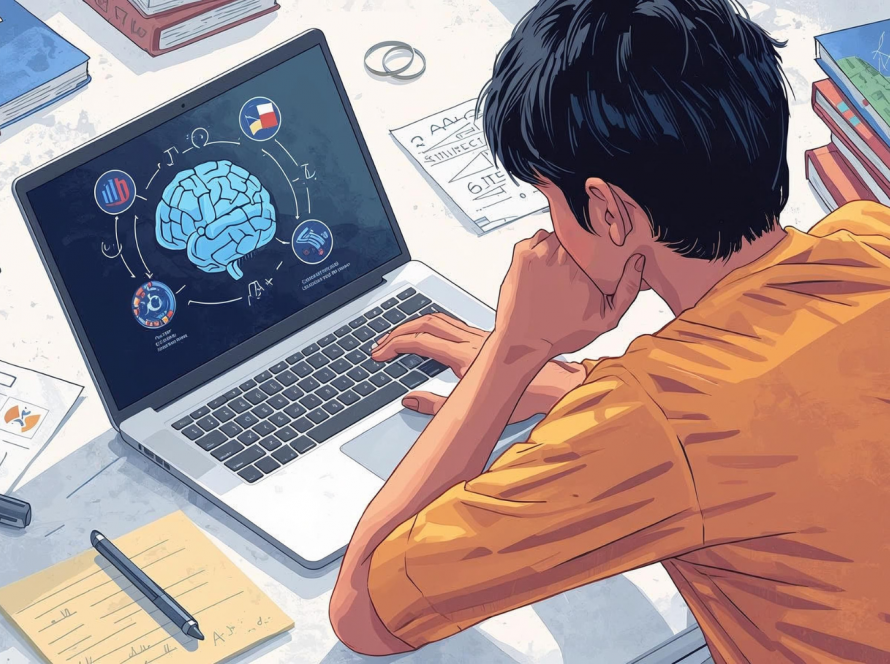At the IACAC conference last week, I co-presented a session on future‑proofing admissions and counseling in the age of AI – and the response was overwhelming. Not because I have all the answers, but because I’ve spent years living at this intersection – working alongside educators, counselors, and institutions – wrestling with the very shifts AI is now accelerating. The questions, both in the room and in the conversations afterward, were unfiltered, urgent, and unmistakably human. People are worried. They see tools evolving at breakneck speed, headlines predicting job losses, and institutions chasing efficiency. They wonder: Where does that leave me? Where does that leave us?
At the session, I joked that maybe we’ll have to start adding a new line to our pronouns: He/Him/Human – just so people know we’re real. But behind the humor is a serious point: in a world increasingly shaped by artificial intelligence, our humanity itself is becoming a differentiator.
These concerns about AI are not only valid, they’re necessary. Fear forces us to confront what we’ve taken for granted. And in higher education, we’ve assumed human insight, wisdom, and care are constants. But what happens when algorithms start advising students, grading essays, or predicting who will succeed? What happens when the work you’ve done for decades suddenly feels like it could be automated?
Here’s my conviction: we are entering what I call the Human Advantage Economy. And I want to popularize this concept in higher education – and beyond – because it reframes the entire conversation about AI. Instead of asking what we stand to lose, we ask what we have to offer that is irreplaceable.
Machines excel at speed, scale, and pattern recognition. But they cannot do these three very uniquely human things that define our humanity: discern, wander, care. These are not just comforting ideals. They are a framework for relevance in the AI age.
Discern: See What Truly Matters
AI can give you infinite options, but it can’t tell you which ones will shape a life, a policy, or a future. Discernment is our ability to filter through the noise and sense what matters. In admissions, it’s the difference between reducing a student to metrics and recognizing a spark of potential hidden between the lines. In counseling, it’s knowing when to speak and when to simply listen.
How to build it: Practice intentional filtering. Each week, pick three data points, articles, or stories and ask yourself: Why do these matter? Who needs to hear them? What will I set aside so I can focus? Share your process with students or colleagues – help them see how you decide what is worth attention.
Wander: Step Beyond Your Lane
Machines process what they are fed. Humans imagine what could be. Wandering is not inefficiency – it’s the birthplace of innovation. The breakthroughs that redefine industries often come from unlikely connections: art influencing science, sociology reshaping technology, literature reframing leadership.
How to build it: Explore without an agenda. Attend a lecture in a field you know nothing about. Read a book or watch a film outside your usual orbit. Invite students to teach you about their passions, even when they don’t tie directly to their majors. Wander far enough, and you’ll start to see what no algorithm could anticipate.
Care: Invest Where Machines Cannot
No AI will ever care that a student is quietly losing confidence. No tool will show up uninvited to support a colleague on a hard day. Care is what transforms transactions into relationships, and relationships into trust. In a Human Advantage Economy, this is the ultimate differentiator.
How to build it: Create micro‑moments of connection. Write one genuine note of encouragement a day. Follow up with students after milestones – good or bad. Pay attention to your team’s emotional weather. These small acts compound into a reputation that no machine can rival.
Entering the Human Advantage Economy
The fear in rooms like the one I was in last week is real. It stems from a truth we don’t always want to admit: if a machine can do your job exactly as you do it now, then yes, it might replace you. But that’s not the end of the story – it’s the beginning of a challenge.
We have a choice: double down on tasks that can be automated – or rise into roles that demand discernment, wandering curiosity, and care. That’s the Human Advantage Economy. That’s what we should be committed to championing, especially in higher education, where we cannot afford to outsource our humanity.
So I urge you to:
- Discern: Sharpen your ability to see what matters – and teach others to do the same.
- Wander: Step outside your lane and model curiosity for your students and peers.
- Care: Build trust through actions that no machine can replicate.
Your HAE Checklist
Use this checklist to measure yourself – and your team – against the demands of the Human Advantage Economy:
- Do I intentionally curate and discern? Each week, am I filtering and sharing what truly matters instead of flooding others with noise?
- Do I create space to wander? Have I explored something outside my lane this month, and encouraged others to do the same?
- Do I show care in visible ways? Who have I encouraged, followed up with, or supported this week?
- Am I modeling these traits for students and colleagues? Do they see me practice what I preach?
- Do I pause to ask bigger questions? Beyond tasks and outputs, am I asking what kind of impact we are actually making?
- Am I building relationships that outlast any transaction? Do I know people who would champion me – or who I would champion – beyond what’s in my résumé?
Check yourself against these regularly. Share them with your students. Build them into your team’s culture. Because in this new era, the institutions – and the people – who thrive will be those who commit to discern, wander, and care at scale.
The question isn’t Will AI replace me? It’s Am I practicing the things that make me impossible to replace?
The next frontier isn’t about outsmarting the machine – it’s about out‑humaning it. Let’s build this Human Advantage Economy together.
Ex Cogitatione, Progressus.
Girish


